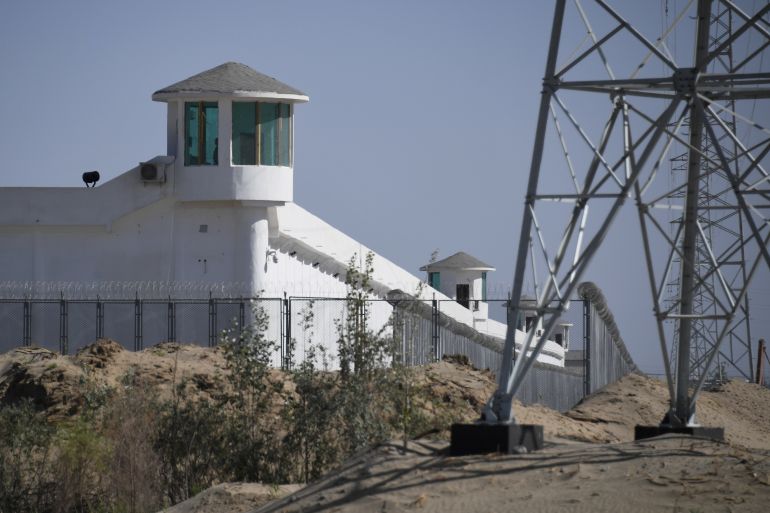China targets Uighurs with more prosecutions, prison terms: HRW
China has increased its prosecution of Muslim minorities in Xinjiang, handing out longer jail terms, an HRW report has found.

China has dramatically increased its prosecution of Muslim minorities in Xinjiang through the formal court system, handing out long prison terms for dubious charges such as “picking quarrels” and giving gifts to overseas relatives, a rights group said on Wednesday.
These criminal convictions are in addition to the detention of an estimated one million Uighurs and other mainly Muslim minorities in internment camps in Xinjiang province.
Keep reading
list of 3 itemsChina rejects Uighurs genocide charge, invites UN’s rights chief
Canada’s parliament says China’s treatment of Uighurs is genocide
More than 250,000 people in the northwestern region have been formally sentenced and imprisoned since 2016, according to Human Rights Watch (HRW).
“Despite the veneer of legality, many of those in Xinjiang’s prisons are ordinary people who were convicted for going about their lives and practicing their religion,” HRW researcher Maya Wang said in a statement.
But still it’s striking to look through these docs, esp the verdicts, in that you go through the pages & in most of these cases, you can’t find a real crime. In one case, Jin Huaide, a Hui Muslim, is sentenced to life for “splittism” because he’d proselytized Islam. 3/8
— Maya Wang 王松莲 (@wang_maya) February 24, 2021
The US State Department has said China’s actions in Xinjiang amount to genocide, while Canadian legislators on Tuesday passed a similar declaration.
Spike in criminal sentences
HRW said criminal sentences in the region had spiked between 2017 and 2019 during a crackdown on Uighurs and other mainly Muslim minorities.
Xinjiang courts sentenced nearly 100,000 people in 2017, up from less than 40,000 in 2016, the organisation said, citing government data.
The rights group said police, prosecutors and courts had been placed under pressure to “deliver swift and harsh punishment” in the name of “counterterrorism”, causing many to be imprisoned without committing any genuine offence.
Sentences were handed out for activities including “telling others ‘what is haram and halal'” and bringing gifts to relatives in Turkey, HRW said, noting prison terms have also grown longer.
Prior to 2017, approximately 11 percent of the sentences carried prison terms of more than five years. In 2017, 87 percent did.
China’s treatment and incarceration of Muslim minorities in Xinjiang, which includes accusations of forcibly sterilising women and imposing a regime of forced labour, has drawn a growing chorus of international condemnation.
“International pressure on the Chinese government should be escalated for an independent investigation in Xinjiang,” Wang said. “That’s the best hope for the release of all those unjustly detained or imprisoned.”
After initially denying the existence of camps in Xinjiang, Beijing later defended them as vocational training centres or “political education” camps aimed at reducing the appeal of so-called “Islamic extremism”.
Foreign minister Wang Yi on Monday said Beijing’s treatment of ethnic minorities in Xinjiang was a “shining example” of China’s human rights progress.